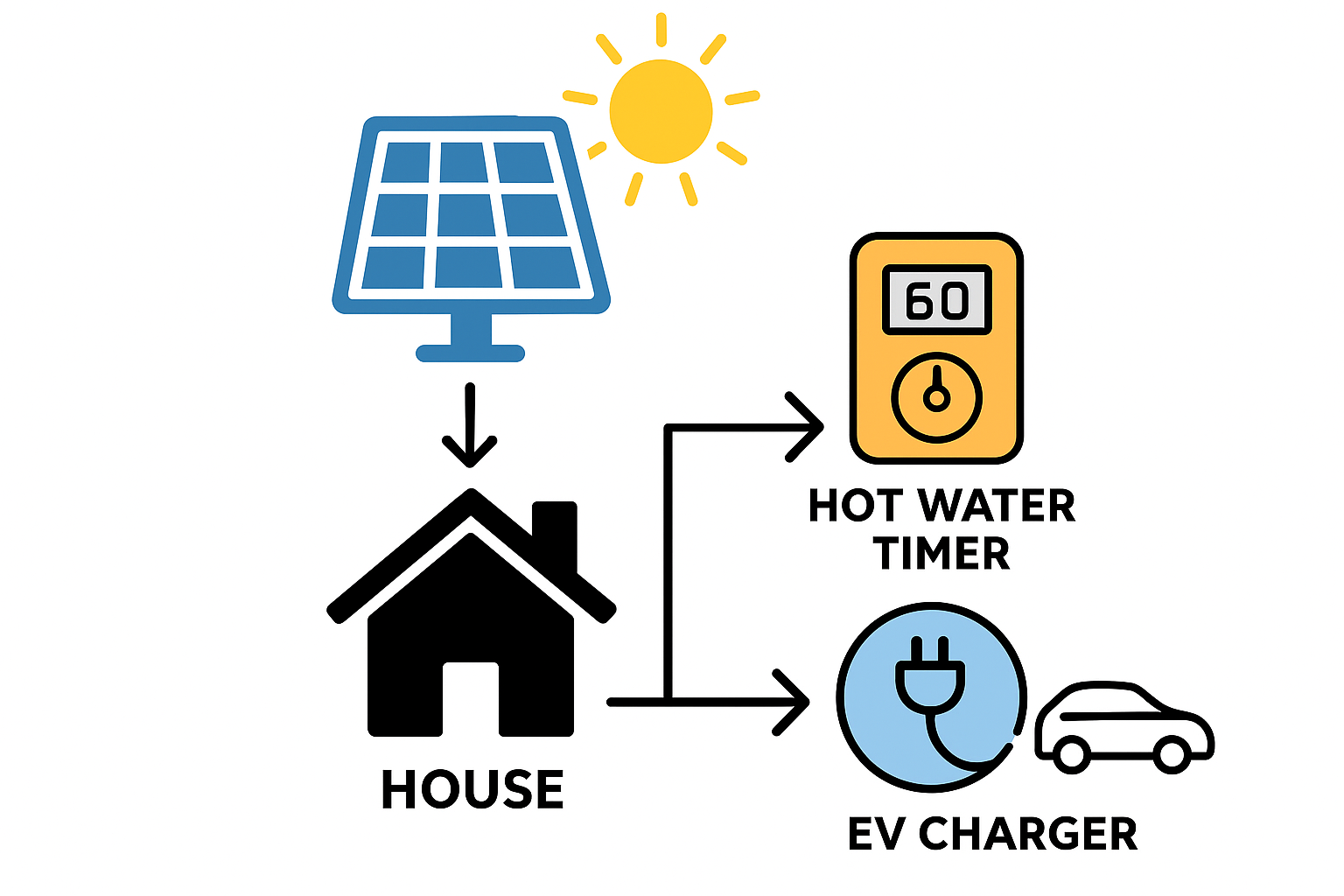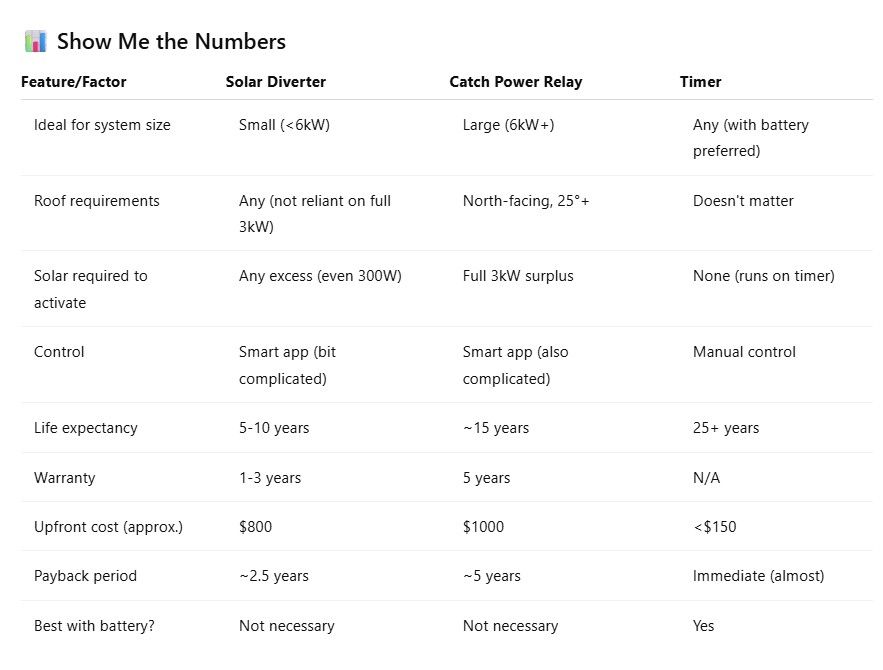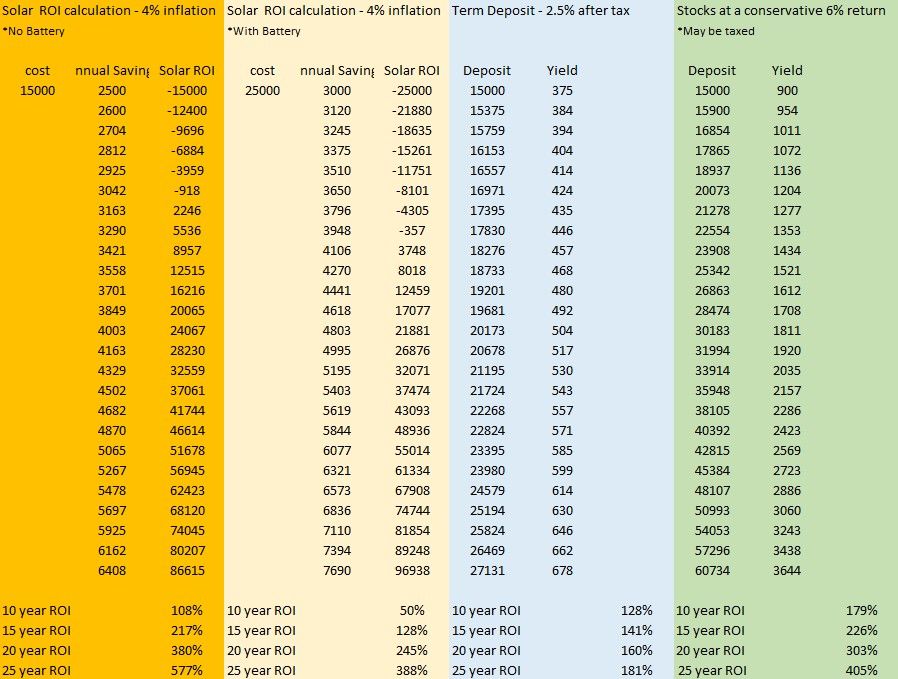Got a hot water cylinder + solar? Here's some hot water hacks.

Hot water eats power. Solar saves it. But should you go heat pump or cylinder? Timer or diverter? Here’s the smart way to choose.
So naturally, if you’ve got solar panels (or you're thinking about getting them), it makes sense to ask: how do I get that free sunshine to heat my water?
Enter the options: Solar Diverter, Catch Power Relay, or a humble old-school Timer. Each one has its place, but getting the wrong one could either waste your solar or cost you a lot of money on power and the inevitable replacement.
So here it is — no fluff, no sales pitch, just a cheeky and brutally honest breakdown of when to use what, and why.
🔋 Solar Diverters: The Smart Sipper (To be used with a traditional cylinder)
Best for: Smaller solar systems that rarely have a full 3kW spare for the hot water cylinder.
What they do: Instead of waiting until there’s 3kW spare (the usual heating element requirement), diverters sip excess solar in small, variable amounts. Think of it like slowly filling your glass from the drips instead of the tap.
The Good:
- Increases your solar self-consumption
- Can heat your water even with only 300W-500W spare
- Makes the most of small systems
- Payback period generally sits at around 3 years, but depends on your energy rates — including your buyback rate.
The Bad:
- Expensive upfront (~$800 installed)
- 1 to 3-year warranty, 5–10 year lifespan (let’s hope it lasts closer to 10)
- You’ve got to become the master of another complicated phone app.
- On rainy/cloudy days, it will default to grid power — usually between 4pm and 8pm when power prices are sky high, so you can have warm showers in the evening.
🚗 Catch Power Relay: The Strong, Silent Type (To be used with a traditional cylinder)
Best for: Big solar systems (6kW+), ideally north-facing with a good roof pitch (25°+). Not for shady characters or east/west arrays.
Why? Because East-West solar systems and low-pitch north systems don’t perform very well in the coldest quarter of the year.
What they do: When the solar system has a full 3kW spare, the relay turns on and blasts it into your hot water cylinder. Simple and effective — but only when there’s enough juice.
The Good:
- Great on big sunny systems
- Fewer moving parts = longer lifespan (~15 years)
- No slow sips — just a big solar chug when possible
- Can be programmed to trigger at different thresholds (e.g. 2kW available? Fire it up).
The Bad:
- Relies on hitting a solid 3kW threshold (or something less ideal)
- Still defaults to grid power if there’s not enough sun — usually the dreaded 4–8pm slot
- You’ve got to become the master of another complicated phone app.
- 5-year warranty
- Payback period closer to 5 years because it’s not as efficient as a diverter.
⏰ Timer: The DIY MVP (To be used with a traditional cylinder)
Best for: Control freaks, people with batteries, or anyone who just wants simple and cheap.
What it does: Turns your hot water cylinder on at set times (usually mid-day). That’s it. No AI. No apps. Just good ol’ clockwork.
The Good:
- Cheap as chips
- Can last 25+ years
- Pairs well with batteries (a sunny morning charges your battery; a cloudy midday means your battery discharges for your timed hot water loads)
- Brilliant for very large single-phase systems with mid-day curtailment due to the 5kW export clipping. In this scenario, a timer is better than Catch Power because you don’t want your hot water cylinder heated before lunchtime.
The Bad:
- Not smart (but you are, and so are solar batteries)
- Doesn’t optimise solar usage as well as a diverter or relay
- Much less efficient for homes with smaller solar systems
Pro Tip: Most homes will need to add a short “boost” period around 5am if morning showers are a priority. This could mean ~30% of your hot water energy comes from the grid. But that’s no different than using a Catch or a Diverter — if the sun’s not shining, someone’s paying.
🌀 Heat Pump Cylinders: The option for ultra high power users
This is where things get interesting. Many solar companies in NZ are pitching heat pump cylinders to everyone, including those with traditional hot water cylinders. But we don't think they're for everyone.
A heat pump hot water cylinder can slash your hot water energy use by 60–70%. But the reduction in energy use is less relevant if you have a solar system that generates tons of energy when you're not home, and when your cylinder could be heating.
A standard 250L electric cylinder might chew through 15kWh to heat from cold, but a good heat pump can do it with just 4kWh. Sounds like a slam dunk, right? Not so fast.
- Life expectancy: A traditional cylinder will often last 20–30 years. A heat pump cylinder? More like 12–15 years.
- Maths check: Most of the money you save on power will end up funding the replacement of the heat pump cylinder in year 12–15.
- Compatibility issue: Heat pump cylinders can’t use diverters — they need a steady chunk of power, not variable drips. That knocks out one of the most effective solar hot water tricks.
- *Potentially* Smarter spend: Instead of dropping an extra ~$6,000 on a heat pump cylinder, you could add 10 extra panels for as little as $5,000. Those panels will give you reliable, surplus solar to cover the extra energy demand of a traditional cylinder — while leaving you with a system that lasts decades, not just one.
Verdict? If you’ve got a big family of long-shower addicts, a heat pump cylinder might make sense — just go in with your eyes open. For most households, an extra row of panels and a trusty old cylinder is the smarter, more reliable play.
The case for a Heat Pump Cylinder increases if you're coming from gas. Check out our other blog.
🍟 Some options to consider - just an indication
Consider these:
- 12 panels installed + a good quality heat pump hot water system: $21,000
*The heat pump cylinder will likely need replacing around year 15, and it will need maintenance every 5 years. - 22 panels installed + a traditional heat pump cylinder: $21,000
*Both the panels and the cylinder are likely to last 30 years.
Same price. Similar outcome on your power bills, but a very different story once you factor in replacement and maintenance costs.
⚡ Pro Tip: Hot Water Timers Don’t Break Your EV Charging
We get asked this all the time: “If I put my hot water on a timer, won’t my EV charger get confused and waste my solar?”
Nope. Not even close.
Modern EV chargers all come with CT clamps — they measure the difference between what your solar is making and what your house is using. Whatever’s left over gets sent straight into your car.
So if your hot water kicks in on a timer at midday, the EV just chills out and dials down its charging rate to match. Efficiency stays high, solar gets gobbled up, and you don’t have to play referee between your car and your shower.
👉 In short: the EV chargers are smart. Your solar system can be dumb as a rock. It still works beautifully.
🌟 Final Verdict for consumers who already have a hot water cylinder
Small systems (<4kW)
- If you can only fit a small system, get a diverter if you want to squeeze every drop of solar.
- Or; get a heat pump cylinder so that your solar can be put to use elsewhere.
Medium systems (4–6kW, north-facing, good pitch):
- As above, if 4-6kW of panels is all you can fit, a heat pump cylinder might be the right move.
- If you're a low power user, a diverter or timer paired with the ol' trusted hot water cylinder will also work a treat!
Large systems (6–9kW):
- Catch Power if you don’t have a battery. Timer if you do.
- If this is the largest system you can install and your family are high energy users ( >1500kWper month); then maybe get yourself a heat pump cylinder. The rule of thumb is - you want a system that generates 120% of your energy needs, including your hot water. If your panels can't do this, reduce your energy demand with a heat pump cylinder.
Very large single-phase (9–13kW):
- Single phase systems with or without a battery - Timer, hands down. You need to ensure huge energy demand at mid-day to mitigate the loss from the typical 5kW per hour export limit (in most areas).
- Two or Three Phase systems - A diverter would be better as there's less solar energy coming down each phase, so smarter allocation of solar to hot water is needed.
- Got a super high-use household? Consider a heat pump cylinder.
And remember: the better your solar buyback rate compared to your power price, the less difference these devices make. If you’re only saving 5 to 10 cents per kWh by diverting solar into hot water instead of selling it back, don’t sweat the inefficiency of a timer.
Need help making the right call? That’s why we exist. Equity Solar Brokers: keeping you anonymous, and helping you make smart solar decisions.




